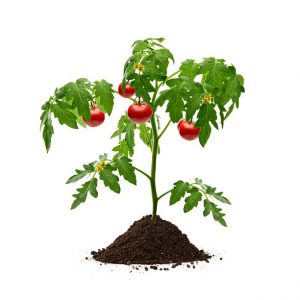. . . My indirect history was through my grandparents who emigrated from Poland.

Tomatoes plant with soil
My grandmother’s family were farmers best described in my understanding as “tenant farmers”, always a no-win situation. My grandfather’s family owned a horse farm which was seized in one of the takeovers by either Russia or Germany. So they emigrated to the United States and, apparently, neither one wanted to reconnect with the earth. My grandfather opened a small grocery store and my grandmother went to work for Wamsutta Mills as a loom operator.
My first actual memory of a garden was a community Victory Garden organized on a vacant lot in Queens at the start of World War II. It is a very brief memory of my father pulling some carrots out of the soil. I was five years old. Why wasn’t I very impressed? Well, for one thing, my father obviously wasn’t impressed – we didn’t participate in the garden when I was six. Also, people of my parents’ generation boiled all the goodness out of vegetables. All the flavor and the vitamins went down the drain with the cooking water. (Now that’s the grown-up talking.) I just didn’t like vegetables and didn’t know why. At that point I found the red-orange dye button on the white bag of oleo-margarine infinitely more interesting, as it was my job to massage the dye button into the oleo so that it looked more palatable than it actually was.
A diversion that will lead back to gardens:
My maternal grandmother owned a boarding house. No feminist, she only rented to men because she said that women were too much trouble. She didn’t hold too much with roomers malingering in their rooms. She didn’t offer meals, although she did do laundry for an additional charge.
One of her roomers was a man named Antonio DaSilva. I met him when I was about two years old. I couldn’t pronounce Mr. DaSilva, so I called him Sylvia which lasted as his nickname the rest of his life. Sylvia had emigrated from Portugal and worked here as a waiter. What I didn’t know at the time was that he had grown up on a farm and yearned to work with the earth again. He roomed at my grandmother’s to keep his expenses down. He poured whatever was left over from his pay and tips into savings and when he had enough, he bought property. At the end of his life he owned property all over Queens.
A decade or so after I first met him, Sylvia needed surgery. Unlike today where so much surgery is outpatient or a couple of days in the hospital, surgery then was a major event requiring a long hospital stay and an even longer recuperation at home. Sylvia mentioned the surgery to my grandmother and asked if he could recuperate in the boarding house. My grandmother said she’d think about it but, apparently, in a voice meant to discourage. Then Sylvia did something no one could have envisioned: he proposed marriage to his hard-hearted landlady.
Having become a man of property and married, Sylvia retired from waiting tables and happily turned the entire backyard of my grandmother’s lot into a garden about 2500 sq, ft. He also built a pergola covering the steps from the kitchen and planted a grape arbor for the making of wine.
Being experienced at growing, he had an active garden from the earliest spring to the very end of fall with tomatoes and other summer vegetables as well as all-season vegetables like carrots and turnips and then winter vegetables like cabbage, winter squash.
If I was more impressed with his wine than his vegetables during my adolescence and early adulthood, it was that drinking wine was the sign of a grown-up (adolescents need that).

